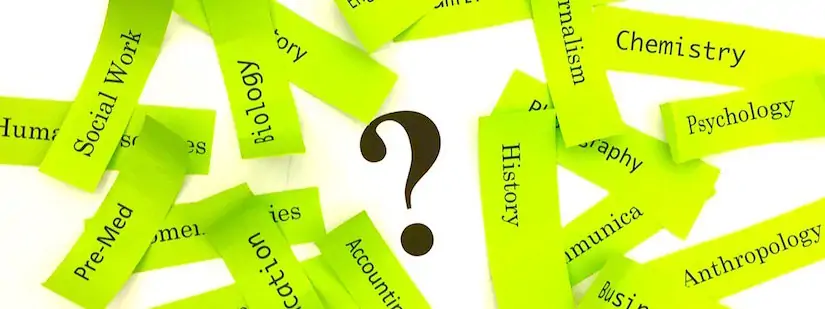
How to Choose a College Major
Deciding where to go to college is tricky, but once you get to college, there’s another tough decision on the horizon: what to major in. Unless you have a very specific idea of what you want to do post-graduation, it can be difficult to pick a major.
Here are some tips to make this process a bit more straightforward for students who aren’t quite sure what they want to study.
Tip #1: Find out what you don’t like first
The idea is to major in something you’re passionate about. For students who are unsure of what to study, the first semester of college is a great opportunity to explore a bit. Colleges offer all sorts of classes that are more specialized than what you’d find in a high school classroom—and new students, having never been exposed in certain subjects, have no way of ruling things out. Try a few different classes that seem interesting to you, and pay attention to what you really don’t like before focusing on what you do—eliminating specific fields is helpful, particularly early on in your collegiate career.
Tip #2: Read about the major requirements
Maybe you want to major in finance, but then start reading through the major’s requirements and realize you have to take two calculus courses, when you absolutely hated calculus in high school. Or maybe you’re considering a comparative literature major in high school—but you have to take a language, when you struggled with Spanish classes previously. Majors have all sorts of additional requirements beyond core classes, and you should be fully aware of those requirements before making a commitment.
Tip #3: Talk to your advisor
Many colleges require you to meet with your advisor before choosing a major, but even if your school doesn’t, you might want to schedule a meeting with your four-year advisor to discuss the pros and cons of a major. Advisors can offer you insight from their years of experience. They can also refer you to someone else if they don’t feel equipped to answer your questions. You might also want to talk to an older student currently on the major track you’re considering. Whatever you decide, it’s smart to have a conversation with someone else within the school before committing.
Tip #4: Consider data regarding majors
There are tons of data points available about the majors that are the most popular and the majors with the best earning potential. This data might play into your decision. It’s helpful to look not just at data on a national level, but also at your school in particular. Is your school highly-ranked for certain majors? Is there information on job placement rates post-graduation? Knowing data about your school can help you determine what strengths you may be able to take advantage of.
Numbers are helpful, but remember that numbers also are sometimes misleading. If you’re really passionate about a particular area but feel pressure to pick another major that yields higher average earnings post-graduation, keep in mind that these numbers are just averages, and there are exceptions to every rule.
Ultimately, You Dictate Your Career
You might feel like once you’ve chosen a major, you’ve chosen a career. While what you major in will likely dictate what direction your career goes in—especially when you’re searching for that first internship or post-grad job—it’s important to remember that people have successful careers all the time in industries that have little to do with their majors. Your major will definitely dictate your college curriculum, but it doesn’t have to dictate your career.
----
Choosing a major may be hard, but citing doesn't have to be! Cite easily in MLA format, APA format, Chicago, or more with BibMe citation tools. ...
6 Simple Tips for Crushing the SAT Reading Test
Are you working on preparations for the SAT, but just can’t seem to master the Reading & Writing section? If so, we’ve got some tips for you to get your best score yet!
1 - When asked about grammar, don’t worry about comprehension
You do not have to understand the prose of a text in order to evaluate its grammatical correctness. Instead, focus on grammar rules like comma usage and structure. Test designers will often throw in challenging writing to confuse the test-taker, even though the question at hand is a simple one.2 - Use underlining for important points in passages
Any time a new character is introduced, the setting changes, or when you encounter a tough vocabulary word, it can be helpful to mark it for questions that will likely appear over that area or detail of the passage later on.3 - Learn to speed read
Learning how to read more efficiently can take time and requires a lot of practice. But, by learning how to speed up your reading, you can free up some additional time to answer and think about tougher questions. Ask your English teacher for some help and keep practicing increasing your speed while still having a good grasp on comprehension.4 - Break down words
Read unfamiliar words slowly in your head and try to break them into parts. Maybe you can’t remember the definition of the word “oceanography” but if you remember that “ocean” deals with water and “ography” refers to the study of a particular subject, you’re likely to figure out oceanography is the study of oceans. Apply this to complex words to help you get a basic understanding of the word, even if you aren’t 100% sure of the exact definition.5 - Watch the clock
Don’t devote too much time to a single passage or set of questions. Instead, break them up into even time intervals and spend an equal amount of time on each one. Remember that every question is weighted equally. Easy questions count just as much as the harder ones. It’s always a good idea to have a watch with you, but do make sure that any noises are turned off before you enter the testing room.6 - Read for pleasure
It can be tough making time to read a book with the pressures of school and extracurriculars. But, doing so will pay off hugely when it comes time to take the SAT. Try to find passages like those on the test: books broken down into short readings at a high level. Though it’s no longer necessary to study SAT vocabulary words, it certainly doesn’t hurt to expand your vocabulary. With these tips in mind, you are well on your way to acing your SAT Reading and Writing sections!Have a paper coming up? Cite your sources with ease using BibMe citation services for MLA format, APA format, and more!
--------------------------------------------------------------------------------------- ...
How to Use a Database: An Introduction
Online databases are convenient and reliable sources of information for the completion of research projects. They can house thousands of books, journal articles, magazines, and art collections all within one easily searchable platform. The large scope of these databases, however, means that they may not always be the simplest sources to navigate. Here are some tips on how to efficiently use databases like JSTOR and WorldCat for a research project.
Take Advantage of Full-Text Searching
Most databases support full-text searching on their website, meaning that you can type in full words, phrases, or sentences to find a reputable source. Start With a General Search If you begin researching too specific of a topic, you may end up with very few search results.Do an Advanced Search
Once you have narrowed down a topic, try an advanced search. Most databases have an advanced search option that lets you choose more specific search criteria. For example, options to look for certain source formats (e.g. book, video, image, journal, etc.) and to narrow your search to sources published on or before a certain year.Try Boolean Operators
“Boolean operators,” or the words “AND,” “OR,” or “NOT,” can be helpful when using the advanced search feature and when inputting multiple words into your search. Using the operator AND will retrieve articles that mention both terms somewhere in the article. Using OR between the two terms will retrieve articles that mention either term. If you wanted to exclude terms, you would use the Boolean operator NOT. For example, if you were writing a paper on the Civil Rights Movement, but not on Martin Luther King, Jr., you would type “NOT Martin Luther King.” If Pinpointing a Source, Be Specific If you know what source you are looking for already, try searching by author, title, identifying number (books have ISBN, journals have DOI), or a combination of any of the above.Keywords Are Your Friend
If you are unsure of the specific source you would like to use, but know what subject your paper is covering, try using specific keywords. For example, if your paper is on Charles Darwin, you could use relevant keywords such as “Origin of Species,” “H.M.S. Beagle,” or “Darwinism.” You can also use phrases, such as “Charles Darwin Galapagos.” The best thing to do here is to be as specific as possible. Use keywords that are closely related to your topic.Need Primary Sources?
When looking for primary sources, you should utilize archives and special collections. These types of databases are more likely to hold older sources, and works published during the event you are researching. A good place to look is the National Archives at www.archives.gov, or another large research library. Keep in mind that primary sources don’t necessarily have to be books. They could be maps, letters, photographs, paintings, etc.Need Secondary Sources?
When looking for secondary sources, start your research by looking for the most recent source related to your topic. Make sure that your argument/thesis still fits in with current academic research on the subject. New ideas and breakthroughs get published every day!Avoid Wikipedia, If Possible
While a good place to get a general idea of your topic, it is not always a reliable container of sources. Instead, try using online encyclopedias, such as Encyclopedia Britannica.Deciding on a Database
If you’re trying to decide which database to use, see if you can find one that relates to your specific subject area. For instance, Brigham Young University has a database for primary sources related to British History from the years 1486-1688. It is also helpful to ask a librarian for assistance.Don't Forget to Cite the Source, Not the Database
Knowing what information to use when creating citations can be confusing. Just remember that you should cite the resource you are using and not the database itself. For example, if you used JSTOR to find information on dinosaurs, you would cite the book chapter or journal article found in your search. In MLA format, the database you used is mentioned at the end of the citation. In APA format and Chicago style, your teacher can see that you used a database by looking that the URL you include.These tips on using a database are helpful, but the best way to learn is to jump onto a database and try it out for yourself. Happy researching!
...
Vancouver Style Citation Guide Coming Soon!
Big news! Vancouver Style!
We are excited to announce that BibMe will soon have a comprehensive citation guide for Vancouver style! We hope to have the guide ready to go by the start of this coming academic year. In the mean time, you can use our Vancouver (author-date) or Vancouver (brackets, no "et al.") automatic citation generators!
[caption id="attachment_178" align="alignnone" width="660"] Modern day Vancouver. (Image Courtesy of Darren Stone)[/caption]
(more…) ...
Modern day Vancouver. (Image Courtesy of Darren Stone)[/caption]
(more…) ...
Turabian or Chicago? What’s the difference?
Have you ever wondered why Turabian and Chicago style look similar? Has anyone ever told you that the styles are the same thing, or that they are vastly different? Have you ever heard that Chicago itself has variations? Hopefully this blog post can clear things up for you.
Turabian vs. Chicago
Turabian and Chicago style look similar because they are the same thing. Yep. After the release of the 16th edition of the Chicago Manual of Style, they officially became the same thing. The Turabian style was created by Kate Turabian (1893-1987), a University of Chicago graduate school dissertation secretary that created a guide for the Chicago style of citation called the Manual for Writers of Research Papers, Theses, and Dissertations. Academics found her guide so authoritative that they effectively named her method of citation presentation as "Turabian". To learn more about the history of Turabian style, read this University of Chicago webpage. So if a teacher insists that you use Turabian instead of Chicago in your next paper, just give them a wink, write a great paper, and use our reference guide or automatic citation generator for Chicago style. Just make sure you're using the correct system of Chicago style.There are two systems of Chicago Style?
Indeed. The Chicago Manual of Style contains two documentation systems: notes and bibliography and author-date. Depending on the subject matter and nature of sources cited, each style is preferred by various specific groups of scholars within academia.
The notes and bibliography style is most commonly used in literature, art, and history, as well as other fields within the humanities. It can accommodate a plethora of sources: both common and also more obscure sources that may not be ideal for the author-date system.
The author-date system is used frequently within the natural, physical, and social sciences. This system provides brief, non intrusive source citing within the text, by the last name of the author and date of publication. These bibliographic form of these citations can be viewed more clearly within the list of references included at the end of author date system formatted essays.
There are only small differences between these two types of Chicago style citations, but it is important that you know which one to use within your discipline. Happy writing!
...
Attention Researchers: ACS, ASA, CSE, IEEE, AAA, and AIP on BibMe!
[caption id="attachment_179" align="aligncenter" width="660"]
